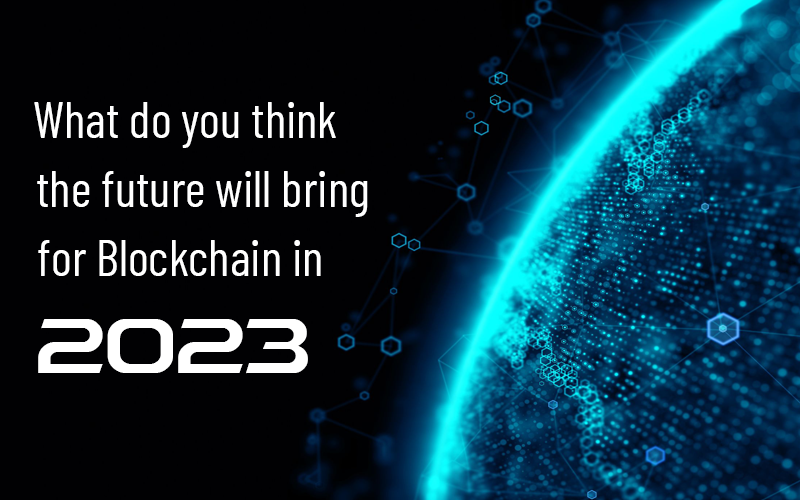With Cryptocurrencies being so prominent and the growth in the Blockchain space, what do you think the future will bring for Blockchain in 2023?
From IT to financial services, government, healthcare and other industries, blockchain is changing how we do business.
Blockchain evangelists are pretty into distributed ledger technology because of the potential it has for securing computers, helping with transactions, working with IoT & real estate, etc. In looking ahead to 2023, we can see that other areas in the blockchain industry are also heating up. In particular, these four industries will likely advance the expansion of blockchain technology and its use.
Blockchain will keep you safe and out of the wrong hands with cloud technology
The global public cloud services market, which includes infrastructure-as-a-service, platform service, and software-as-a-service, was $408.6bn in 2021 according to International Data Corporation. The cloud services industry is still relatively new and it’s had a big effect on the market. Blockchain can change things, like cloud storage. For instance, blockchain technology can help provide better security in the future. A recent article from InvestmentBank.com explains that companies generally allow users to purchase storage space by terabyte. It also says that blockchain is changing the way we use the web. A cloud storage platform could do something similar to other projects. The nodes participating would be getting some kind of a reward for their expense of space, but the consumer would be giving up some storage space.
One of the biggest benefits of blockchain and cloud computing is enhanced security. In the not-too-distant future, it will come as second nature to make the right choice for your business. If your computer has an internet connection, it can easily sync with the blockchain network and access information from other devices. Deleting data from one device doesn’t delete it from all devices on the network. And with no chance of any data loss or change, it’s the best. It’s a very safe idea that you store your data on the blockchain. Not only will it be more private, but also more secure in general. If you use an AI writer then it’ll also help you save loads of time.
The future of Blockchain is hard to predict. We do know that companies will be embracing technology in new ways. It’ll also be common for people to have a digital wallet and use cryptocurrency for paying for goods and services.
Blockchains have the potential to solve a lot of the communication problems faced by governments.
Governments are already going with DLT systems to record their governments, and I can see that trend continuing in the future. The use of digital data has been around for a while, but there’s something else out there called DLT that allows for better trust, transparency and security because of encryption and validation features.
Government organizations can quickly improve their constituent communications & administration with the innovative adoption of blockchains.
For example, blockchain can improve:
•With the processed and tracked old form put into a chain of custody, the government documents will be secure.
• Pre-release government documents are being proofread to eliminate errors and identify potential tampering. The authorities say this will reduce instances of forgery.
• There’s no need for paper-based records thanks to this app.
• Cost controls by replacing paperwork with records stored on the blockchain.
With the widespread use of blockchain, the government will be changed. The law and legal services will also change.
Blockchain is already affecting legal services. There are many different ways it has already changed the profession, including smart contracts and dispute resolution. If you’re frustrated by the lack of transparency in ownership of your intellectual property, then the blockchain has a lot of potential for reducing infringement. It can verify the creation date and time as well as who owns it and when it was used. For example, this technology has been used to create copies of securely created music tracks that cannot be copied or altered in any way to prevent unauthorized.
Meanwhile, solutions that make it easier for attorneys to manage contracts can make you more efficient by letting you produce and execute agreements quickly. As transactions and records migrate to digital workflows, legal departments will be relying more heavily on blockchain for all kinds of purposes in the coming years.
Blockchain IDs are self-sovereign and provide a level of independence
It’s been shown that identity is becoming increasingly important with the move to digital commerce and communications. Current identity systems have many flaws, like being leaky and having none of the assets in the same place. Blockchain does a better job of providing an all-in-one solution for verifying people’s identities and their property. Blockchains let you manage your identity in a way that only you control – no one else can take it from you without your say-so.
Blockchain is an online ledger of transactions. This single source can verify who you are and what assets you have.
Blockchain technology is changing the world. It can be used for securing transactions, verifying identity and ownership of assets. Blockchain is cool; it’s decentralized, meaning not one person can control it which makes it resilient because people all over the world can contribute.
Blockchain tech is being used on a global scale to create a decentralized digital ID system that can verify people, assets, contracts, and other important information without any central authority
People are increasingly looking for ways to control their data, which is what Web3s ambition goal is to tackle. The newest innovations in this field start with blockchain, but they will eventually span throughout the Internet and allow people to share/create content as they wish.
Using blockchain for various purposes is becoming more commonplace across several industries. From cloud services, cybersecurity, and IT to financial services, government, healthcare, legal services, and more–blockchain technology is ever-changing the way we do business. Flourishing with the trend, blockchain technology will bring a new era of privacy and security to our data.
















